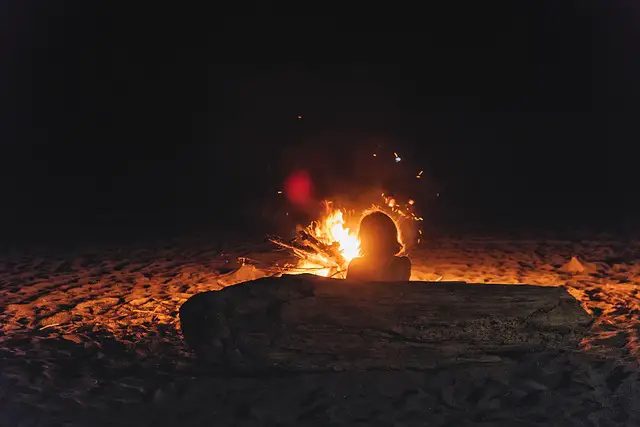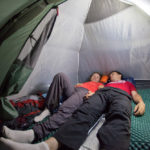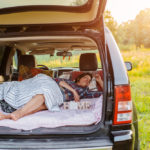If you’ve never done it before, the prospect of sleeping outside without a tent can seem daunting at best and frightening at worst. But with the right precautions, it can also be thoroughly enjoyable.
Few things compare to looking up at the stars or watching the moon rise as you fall asleep.
But, like anything, some tricks and techniques make sleeping outside without a tent safer and easier for the novice camper.
More...

Table of Contents
Is Sleeping Outside Without a Tent Safe?
Yes, sleeping outside without a tent is safe, provided you take the proper precautions.
Your biggest concern when sleeping outside is animals. So, ensure your food is well-positioned away from you and out of reach of animals.
It means doing things like hanging your pack from a tree or using bear-proof food containers to ensure your supplies are safe.
It’s also important to understand that sleeping outside without a tent doesn't mean you can't use any camping equipment at all. You can replace your tent with other camping gear to keep you warm, safe, and comfortable for the duration.
What You Need to Sleep Outside Without a Tent
One reason many people sleep outside without a tent is that it reduces the amount of equipment required for camping. Tents are not only heavy but awkward and have a lot of pieces you need to pack up, like:
Tent fly
Pegs
Poles
Setting up and taking down a tent can quickly become a nuisance, particularly if you plan to camp at multiple sites. Trust us on this. We once did 14 days of wilderness camping, and while we could now set up a tent in our sleep, by day five or six, we were drawing lots for whose job it was.
So, how do you safely sleep outside without a tent, and what do you need?
Bivy Sack
A bivy sack or bivouac sack is a must if you want to sleep outside without a tent. Bivy sacks do the same things as tents but without an elaborate setup. They have the following benefits:
Keep you warm
Keep your sleeping bag dry
Protect you from vermin
Groundsheets
Camping has marched on dramatically since the days of our wilderness camping trips, but we still think you can’t go wrong with a groundsheet if you want to sleep outside without a tent.
Lying one on the ground or over your sleeping pad will give you a waterproof place to sleep. Stringing one up between trees on rainy nights will stop the rain from falling on you.
Sleeping Pads
Speaking of sleeping pads, these are another essential piece of camping gear when it comes to how to sleep outside without a tent.
That’s because, without a pad, one of the comfiest things you can sleep on is moss. But since moss is nature’s sponge, if it rains, even with a good groundsheet, you may wake up damp.
A sleeping pad will provide you with a drier, more comfortable sleep. If nothing else, you won’t have roots jabbing you in the back while you try and get comfortable, and that’s always a good thing.
The best models are ones that you can pump up since they deflate efficiently and are highly portable as a result.
Another trick is to ensure that you store your sleeping pad where animals, whether ants, grasshoppers, or squirrels, can’t get at it. There’s nothing like unrolling a sleeping pad and discovering you’ve got company.
Why Sleep Outside Without A Tent?
There are various reasons people choose to sleep outside without a tent.
Less Equipment
Many people start exploring how to sleep outside without a tent because it means less camping kit to carry around. We all know how bulky a tent can be, especially if you are out on a hike and every pound you carry makes a difference.
But that’s not the only reason.
Weather Conditions
When we went winter camping, we chose to sleep outside without a tent because it was warmer. That sounds counter-intuitive, but there’s an outdoor shelter you can build called a quinzee. If you do it right, the combination of snow, the body heat of other sleepers, and a winterized sleeping bag are significantly warmer than piling into a tent.
Conversely, tents quickly become stuffy if you embark on a summer camping expedition and the temperature skyrockets. It gets exacerbated if you set the tent up early in the day because it gives it an opportunity to soak up the sun until it’s like a portable mesh oven.
In both cases, finding out how to sleep outside without a tent might improve your sleep while camping.
Tips for Sleeping Outside Without a Tent
We talked about what to bring with you if you want to sleep outside without a tent, but are there other tips you should be aware of?
The short answer is yes. Sleeping outside without a tent requires a combination of foresight and the ability to locate or create the perfect camping site.
Watch the Weather
If you decide to learn how to sleep outside without a tent, the first thing to do is pay attention to the weather. No forecast is perfect, but being able to guess if or when it will rain and how warm or cold it might get will help you pack the right camping essentials.
Rain isn’t the only thing you have to look out for, either. Driving winds will also have a detrimental effect on sleeping outside without a tent.
Find the Right Site
You can mitigate some of the effects of wind storms by choosing camping sites that offer shelter. Look for the following features:
Boulders
Hills
Trees
All of these can help shelter you from the wind, especially if you combine them with an overhead groundsheet.
Also look for dry, flat areas. It’s tempting to set up on something like moss, but this has drawbacks, especially if rain is on the forecast.
Don’t Eat Where You Plan to Sleep
As we said, animals are your primary concern if you’re sleeping outside without a tent.
Food is one of the biggest attractions for animals sharing your campsite.
No one wants to wake up to animals looming over them or scurrying across their legs, especially if there’s no tent between you and them.
One way to ensure animals don’t come nosing around you while you sleep is to designate a separate eating area. That way, even if animals do come by and express an interest in the remains of dinner, they at least won’t be rooting through your sleeping bag.
To further discourage animals, ensure where you store your food is protected from interlopers. A sturdy rope to suspend a food pack from a tree branch is a tried and tested technique, but increasingly so are bear-proof storage bins.
Build a Shelter
Sleeping outside without a tent doesn’t have to mean sleeping open to the elements. If you happen to be brave enough to go winter camping, the Canadian quinzhee is a straightforward and warm alternative to a tent.
All you need to do is collect a pile of snow, hollow it out, and crawl inside. It is affordable, efficient, and insulated. However, this isn’t a viable alternative for claustrophobic people because it makes for tight quarters.
You can build lean-tos from large sticks in summer or use a groundsheet to provide overhead protection.
If you opt for a lean-to, the most effective way to build one is to find a sizable tree and use it as the foundation of your shelter. It will support the other branches you choose to incorporate.
Keep in mind that you don't need to decide between one or the other. You can always build a lean-to and waterproof it with a tarp afterward.
When You May Need a Tent
Despite an interest in how to sleep outside without a tent, sometimes it just doesn’t work out. This option might not be the best idea if:
You are camping with an asthmatic person
Your campsite has too many vermin to fend off entirely
Unpredictable weather
It’s also worth noting that the rules about sleeping outside without a tent vary by region. So, if you plan on camping abroad, make sure you do your research before heading out. These legal changes sometimes apply even to people using a tent.
The last thing you need is to incur a fine for unwittingly breaking a law you didn’t know existed, so brush up on the rules of the place you’re heading before you set out.
So, Are You Ready to Sleep Outside Without a Tent?
That’s the 101 to braving the elements without a tent. It can be an incredible experience and often much more comfortable than sleeping in one.
That said, you need to keep track of the weather, bring appropriate camping equipment and clearly distinguish between eating and sleeping areas.
Looking out for campsites that give you shelter from inclement weather will also make spending the night outdoors without a tent more comfortable.
And remember, even if you don’t pack a tent, don’t feel you can’t have any protection at all. With a bit of effort and creativity, you can cobble together a shelter that is cooler than an overheated tent but still open enough to the elements that you can experience nature without the need for a tent.
- Are Merrell Shoes Good? – An Unbiased Review of Merrell Footwear - December 9, 2023
- Where Are Merrell Shoes Made? - December 9, 2023
- Camping in 40-degree Weather: Tips and Tricks - September 25, 2023

![How Much Water Do I Need For Camping? [Guide For Beginners] How Much Water Do I Need For Camping? [Guide For Beginners]](https://grandcircletrails.com/wp-content/uploads/2021/12/How-Much-Water-Do-I-Need-For-Camping-1-150x150.jpg)


![How to Secure a Tent without Stakes? [5 Tips] How to Secure a Tent without Stakes? [5 Tips]](https://grandcircletrails.com/wp-content/uploads/2022/05/How-to-Secure-a-Tent-without-Stakes-150x150.jpg)

![How to Inflate an Air Bed without a Pump? [Most Effective Ways] How to Inflate an Air Bed without a Pump? [Most Effective Ways]](https://grandcircletrails.com/wp-content/uploads/2022/07/How-to-Inflate-an-Air-Bed-without-a-Pump-150x150.jpg)